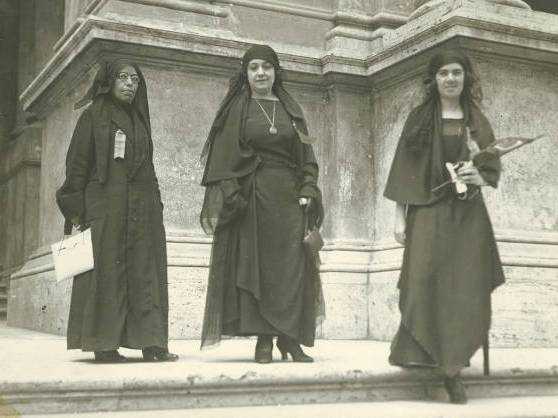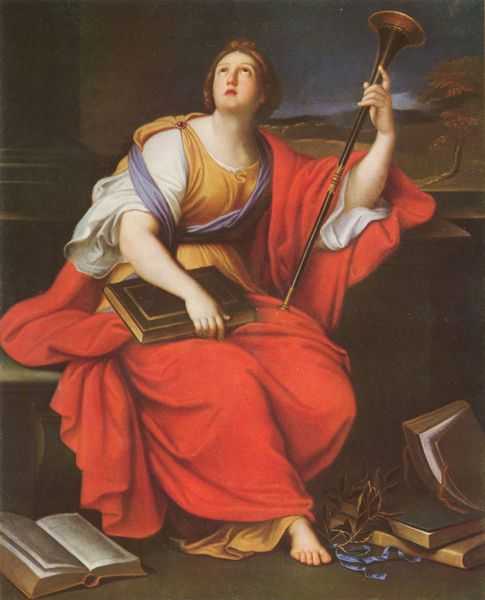CLIO Talks Back

Karen Offen
United States
Archive
- Jun 2011
- May 2011
- Apr 2011
- Mar 2011
- Feb 2011
- Jan 2011
- Dec 2010
- Nov 2010
- Oct 2010
- Sep 2010
- May 2010
- Apr 2010
- Mar 2010
- Feb 2010
- Jan 2010
- Nov 2009
- Oct 2009
- Aug 2009
- Jul 2009
- Jun 2009
- May 2009
- Apr 2009
- Mar 2009
- Feb 2009
- Jan 2009
- Dec 2008
- Nov 2008
- Oct 2008
- Sep 2008
- Aug 2008
- Jul 2008
- Jun 2008
- May 2008
- Apr 2008
I.M.O.W.'s debut blog, Clio Talks Back, will change the way you think about women throughout history! Be informed and transformed by Clio Talks Back, written by the museum's resident historian Karen Offen.
Inspired by Clio, the Greek muse of History, and the museum's global online exhibitions Economica and Women, Power and Politics, Karen takes readers on a journey through time and place where women have shaped and changed our world. You will build your repertoire of rare trivia and conversation starters and occasionally hear from guest bloggers including everyone from leading historians in the field to the historical women themselves.
Read the entries, post a comment, and be inspired to create your own legacies to transform our world.
Clio looks at power dressing in France
2008-04-24 16:17:28.000
Clio comments: Women in political life, especially at the top, do have issues about their appearance. Here is an assessment of the 2007 contender for the presidency of France, Ségolène Royal, and her approach to power dressing, by her biographer Robert Harneis:
"With a minimum of policy declarations, support for her [Ségolène Royal] grew. Initially, at any rate, this was connected to her uniqueness in being an attractive woman in the very male-orientated French politics and the enormous media attention it generated. The readers of the French edition of FHM got so carried away, they voted her the sixth sexiest woman in the world, beating Kate Moss and Naomi Campbell. She said of herself at this time, with evident satisfaction, 'even when I say nothing it generates interest.' . . .
"Despite cultivating an image of spontaneity Ségolène left little to chance in her campaign to seduce the public and, through them, win the primaries. In the summer of 2005 she had work done on her jaw, supposedly because she had a slight lisp, but it also had the effect of making her already pretty smile quite dazzling.
"She took great pains with her appearance and dress, taking advice from longstanding friend and adviser Nathalie Rastoin, a top executive with advertising firm Ogilvy & Mather, who is an expert in public opinion surveys, brand marketing and particularly revitalizing old brands. There was plenty of scope there for her with the Socialist Party. They meet at least twice a week to decide on presentation tactics. It is she that advises what clothes to wear. No detail is too small. According to Isabelle Mandraud of Le Monde, no member of her team is allowed to wear sunglasses when they accompany her. When the television company RTL used a picture of her and François Hollande [Clio: Ségolène?s now ex-partner and father of her four children, as well as secretary-general of the Socialist Party] together on the steps of the National Assembly she threatened to sue because they showed her one step in front of him, which could be misconstrued."
Clio asks: do you think such obsessive concern with image is justifiable? or not?
Source: Robert Harneis, Ségolène Royal: A Biography (Petersfield: Harriman House, 2007), pp. 134-135.

Carrie Chapman Catt collection, Swarthmore College
Egyptian delegates to 1923 Rome Congress of the International Woman Suffrage Alliance, Huda Shaarawi in center
Clio remembers women who made a difference
2008-04-21 11:17:48.000
Guest Blog: Huda Shaarawi (1879-1947) – Egypt
Born and bred to the harem and married at age 13, Huda Shaarawi became a champion of Egyptian independence as well as of women’s rights and freedom. Although women never obtained the vote under the constitution of an independent Egypt, that did not stop Huda Shaarawi and others from becoming important players in civil society. She led veiled women into the streets to protest British rule in March 1919, founded the Egyptian Feminist Union in 1923 , threw off her veil in the Cairo railway station upon returning from a congress of the International Woman Suffrage Alliance in Rome, and integrated embassy parties by appearing there unveiled following the death of her husband, a leader of the Egyptian independence movement. She headed the Wafdist women's organization. By all accounts she was a remarkable woman, forsaking the harem for a courageous, and, of course, controversial role in public life.
Here, in this final passage from her memoirs, she speaks in her own voice about the significance of “exceptional” women and the problems they face:
"Exceptional women appear at certain moments in history and are moved by special forces. Men view these women as supernatural beings and their deeds as miracles. Indeed, women are bright stars whose light penetrates dark clouds. They rise in times of trouble when the wills of men are tried. In moments of danger, when women emerge by their side, men utter no protest. Yet women’s great acts and endless sacrifices do not change men’s views of women. Through their arrogance, men refuse to see the capabilities of women. Faced with contradiction, they prefer to raise women above the ordinary human plane instead of placing them on a level equal to their own. Men have singled out women of outstanding merit and put them on a pedestal to avoid recognizing the capabilities of all women. Women have felt this is their souls. Their dignity and self-esteem have been deeply touched. Women reflected on how they might elevate their status and worth in the eyes of men. They decided that the path lay in participating with men in public affairs. When they saw the way blocked, women rose up to demand their liberation, claiming their social, economic, and political rights. Their leap forward was greeted with ridicule and blame, but that did not weaken their will. Their resolve led to a struggle that would have ended in war, if men had not come to acknowledge the rights of women."
Source: Huda Shaarawi, Harem Years: The Memoirs of an Egyptian Feminist. Translated and introduced by Margot Badran (New York: The Feminist Press, 1987), p. 131.
Who was the first woman blogger?
2008-04-16 11:42:08.000
What difference do women make? What difference can they make? And how do they do it? One way they can make a difference is by speaking up. And speaking out.
Does anybody out there know who was the first woman political blogger? I?ve got a candidate to propose. Olympe de Gouges (1748-1793) is her name and she lived in Paris during the time of the French Revolution. Having no Internet at her disposal, she wrote and published pamphlets and broadsides in thousands of copies, and had them posted on the city walls. Although some claimed she was illiterate, she nevertheless dictated and published plays and wrote a fictionalized autobiography. She had strong views on many subjects, from black slavery (which she strongly opposed) to women?s rights (which she strongly advocated) and she did not hesitate to express those views in print.
During the early years of the revolution, as the long-overdue parliament (the Estates General) met, she campaigned on behalf of a patriotic gift by women to the state, to ease the dire financial situation of the kingdom. In 1790-91 she proposed a people?s court to try criminal cases and a female national guard. She took part in a number of revolutionary festivals, sometimes as the leader of the women?s processions. She also publicized her opinions about various male leaders of revolutionary factions, including some she couldn?t stand such as Robespierre and Marat.
In September 1791 Olympe de Gouges published most famous tract, ?The Rights of Woman? [Droits de la femme]. She deliberately followed the style and format of the celebrated Declaration of the Rights of Man (1789), and invoked its principles on behalf of the female sex. Her analysis of women?s position was far more radical than that of the marquis de Condorcet, who in 1790 had demanded women?s admission to citizenship (including the right to vote), or the English feminist Mary Wollstonecraft, whose Vindication of the Rights of Woman appeared in English and French in 1792.
Before the overthrow of the monarchy in late 1792, Olympe de Gouges addressed all her political writings ? including those on women ? to royal patrons. In the Droits de la femme she called on the queen, Marie-Antoinette, to turn away from counter-revolutionary intrigue with foreign powers (especially Austria, then governed by the queen?s brother, Joseph II) and to champion instead the cause of women, the better to lead a long overdue revolution in morals. ?The revolution will occur,? she wrote in the dedication, ?only when all women are convinced of their deplorable fate and of the rights they have lost in society. Madame, support such a good cause, defend this unfortunate sex, and you will soon have one half the Kingdom on your side, along with at least one third of the other half.?
The Droits de la Femme opened with a challenge: ?Men, are you capable of being just? It is a woman who asks you this question; at least you will not deny her this right. Tell me! Who has given you the sovereign authority to oppress my sex?? She called for a national assembly of women ? ?mothers, daughters, sisters? ? and drafted her Articles in the Preamble. The first of her seventeen articles is: ?Woman is born free and remains equal in rights to man. Social distinctions can be founded only on general utility.? She also demanded that women be ?equally admissable to all public offices, places, and employments? (Art. 6) and that, being equally liable for their crimes, women must have the right to speak out in public (Art. 10). Clearly mirroring Rousseau?s Social Contract, she drafts a model marriage contract, which included a formula for legitimizing children ?from whatever bed they might spring.? She also advocated civil divorce, which the revolutionary government then legalized.
The Jacobins (who took control of the new French Republic in 1792-93) cracked down on women?s political action as part of the Terror. In early November 1793, after a peremptory show trial, they guillotined Olympe de Gouges, making it unmistakably clear that the combination of her monarchist politics with her ?unwomanly? behavior, especially her assertive campaign for women?s equality, would no longer be tolerated. ?She wanted to be a statesman, and it appears that the law has punished this conspiratrice for forgetting the virtues of her sex.? (Feuille de Salut Public, Nov. 1793).
Olympe de Gouges lost her life in defending the rights of women. She was original, brave, and outspoken in a time that did not much appreciate women?s perspectives on political affairs. How many other women have lost their lives for speaking out like this?
Who is your candidate for the first woman blogger? What other forms might blogging have taken in your part of the world even before printing and the Internet?
Be Inspired by Clio, the Muse of History
2008-04-16 00:00:00.000
In the mythology of the ancient Greeks, Clio is the Muse of History. She was one of the nine daughters born to Mnemosyne, the goddess of Memory, and Zeus, the most powerful of the Olympic Gods.
Of course, Clio's role then was to inspire male historians to record heroic and memorable actions - by kings and warriors. It is doubtful that Greek women played any part in the invention of the Muses, except to personify them. However, we women historians (or in the French feminine form historiennes) can now reappropriate Clio for our own purposes. "Herstory" now challenges "History."
Women historiennes prefer that Clio speak for herself. So I am inaugurating this "blog" where Clio can present what women of the past have said about their own lives, can critique historical accounts that have left women out. Here we can highlight the important things we now know from exploring the past in new ways, worldwide. You are invited to join in - to ask Clio questions (as I will also), to comment, to add what you know, and to show, as the sociologist Jesse Bernard once put it, that "so much of what is happening is at the margin between history and news."
Our International Museum of Women thinks that featuring women's history is a vital component of our mission. For our 2008 theme and on-line exhibit, "Women, Power, and Politics," this blog will highlight women's stories, their overlooked and forgotten deeds, and what women's historians have learned about women's history (some prefer calling it "herstory," but this doesn't work in translation) on this theme. We will explore the notions of women's power and its complicated relationship to women's entry into political decision-making. I find inspiration and draw energy from learning about women's history and I'm sure you will too.



